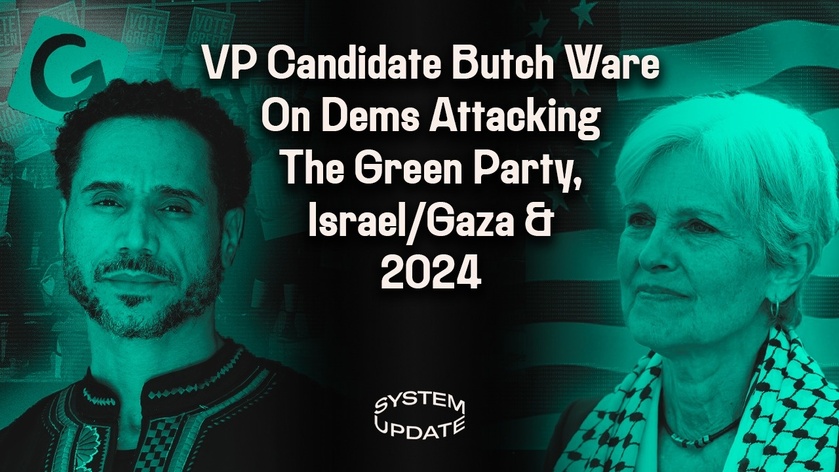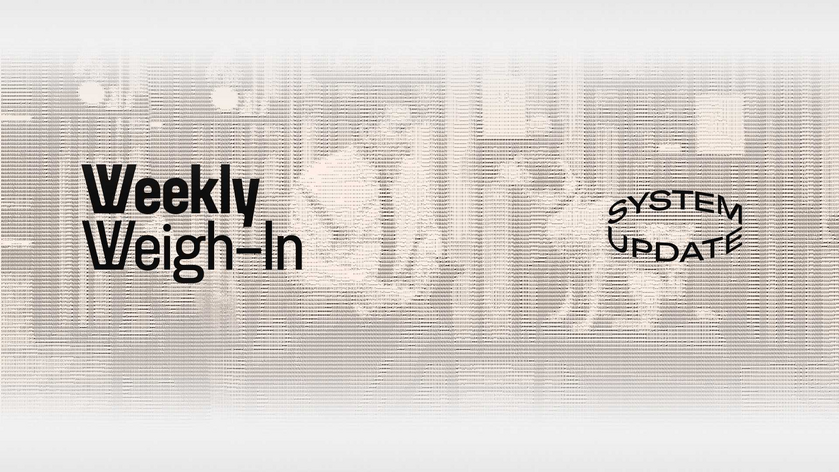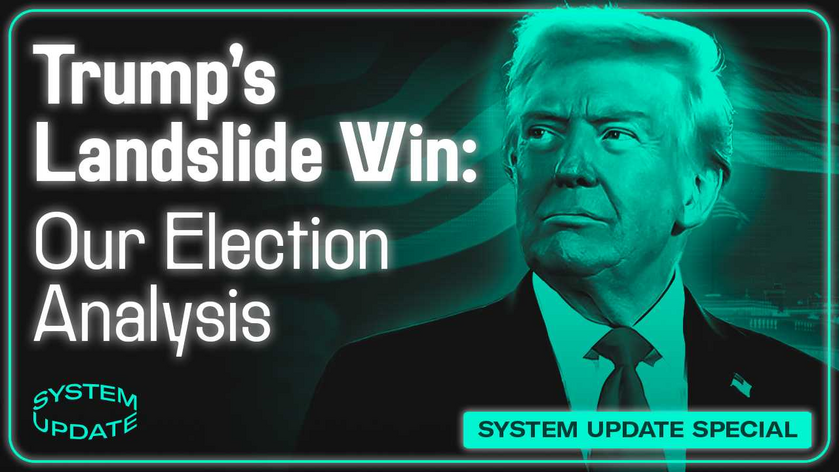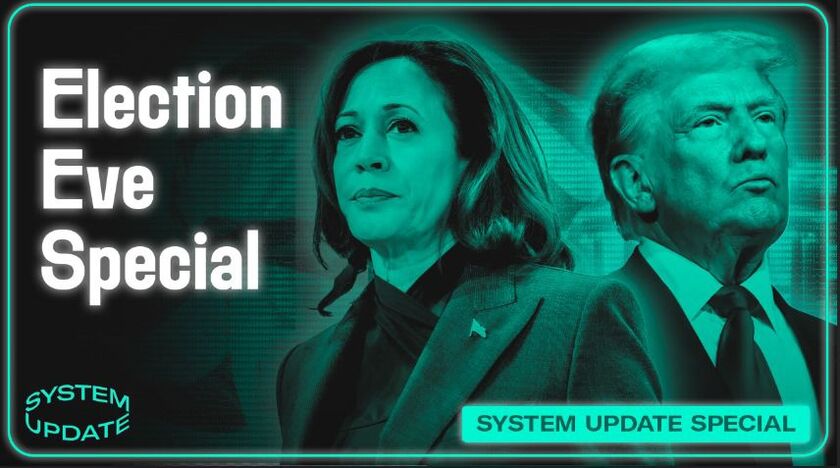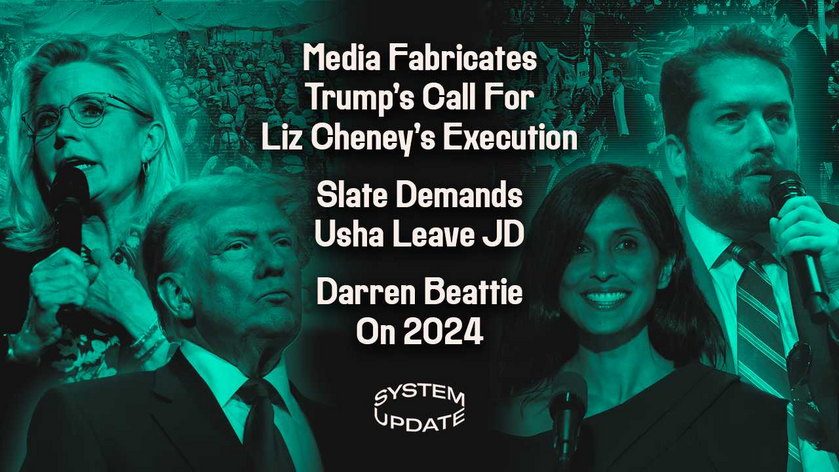Watch the full episode HERE
It's Thursday, September 19.
Tonight: Over the past couple of months, Democrats and their leading surrogates have been dispatched to attack Jill Stein and the Green Party in ways quite vicious and systematic, in ways that I've never seen before. They ordinarily love to dump on the Green Party after they lose an election or to blame the Greens for their loss as if they own those voters by divine mandate and were stolen from them, and more so they like to do that after the election to avoid taking any responsibility in any way for their own losses. But it's very rare – I would say almost unprecedented – that they give the Green Party this amount of attention and oxygen by attacking them so vocally and continuously before the election. That, however, is exactly what Democrats have been doing over the last couple of months. They sent out their self-identified left-wing spokesman for the party, people such as AOC and Keith Ellison to lead the charge against the Greens. And it's very evident that their internal polling, as well as public polling that we've seen, must be showing very alarming data about how many Arab and Muslim voters and even young voters and African American voters intend to vote for the Greens in key swing states such as Michigan and Pennsylvania, because absent that alarming data, they would not be so vocally giving oxygen to the party.
All of these unhinged attacks – AOC, called the Green Party a, quote, “predatory party” – have only fueled that party even more, giving them far more attention. One of the most beneficial results of all of this has been the elevation in terms of platform invisibility of Stein's vice presidential running mate, the newcomer to politics, at least as a candidate, Butch Ware. He's a Ph.D. in history from the University of Pennsylvania and someone who has come from a childhood of immense poverty, instability and deprivation, and yet where he's made quite an impact in a very short period of time due to his eloquent and clearly genuinely felt defense of his political and social values.
Last week, both Jill Stein and Butch Ware appeared on The Breakfast Club, the highly popular political show among African Americans and others and had this very telling exchange with one of the hosts, Angela Rye, as she sought to join the Democratic Party and leading the charge in attacking that duo.
Video. Butch Ware. September 13, 2024.
Prof. Butch Ware: I am personally offended by the way that blackness is being weaponized in this electoral cycle in order to justify white supremacist genocide in Gaza.
Charlamagne Tha God: Expand, please.
Prof. Butch Ware: Malcolm said of Zionism – of the Zionist state, the Israeli state – he said that this is a white Jewish population, an Ashkenazi population being given power by white imperialists to remove brown Arabs from their land, he said, so, therefore, Zionism is white supremacy. In 1979, in “Open Letter to the Born Again”, James Baldwin said the same thing. He said the state of Israel was not created for the salvation of the Jews. It was created for the salvation of Western interests. When you go through Kwame Ture, Malcolm X, James Baldwin, Toni Morrison, Angela Davis, and Assata Shakur, these are all people who cited the Palestinian resistance movement, – not even to bring in Africans, not to mention Nelson Mandela, not to mention Thomas Sankara – who talked about Zionism as being the face of imperialism in the Middle East. Right? This is what the black radical tradition taught me. And the black radical tradition taught me that if we weaponize our blackness in favor of white supremacy, then we become apostates from blackness itself because blackness is not a race. It is an oppositional ideology to white supremacy. I'm a historian of Africa by training. Never before in human history had people speaking hundreds of different languages made themselves into one. People developed a common culture so that you and I can relate to one another. You and I can relate to one another on the basis of a shared culture. And we got our Latin and Caribbean brothers and sisters, you know, especially Puerto Ricans and Dominicans. But also, you know, more broadly, right? They share in that culture. That is a miracle. It's never happened before in human history. Because what happened is that an oppositional identity to white supremacy came into being, and that is us. And when I see that identity now being weaponized to justify the most heinous genocide in our time, like Harriet Tubman is rolling over in her grave right now. Sojourner Truth is rolling over in her grave right now. Bell Hooks is rolling over in her grave right now. Who did I miss? Do you know what I'm saying? The idea that we would weaponize something as sacred as black womanhood and then utilize this to justify blowing up Palestinian kids […]
The more I watch Ware the more impressed I become and if he continues to try to build the infrastructure and the groundwork for a real third-party movement in this country, as he insists he intends to do, I have no doubt that his visibility and impact will only grow as it deserves to.
In a discussion we recorded yesterday – simply because I'm traveling tonight and cannot do the show live; even though you're looking at me, I'm not actually here, I'm traveling – but we sat down with him yesterday and we had a very wide-ranging conversation that covered his personal and political trajectory, his view of the two-party system, his answers to some of the most powerful and good faith critiques of the Green Party, what he has been learning from his ongoing conversations with Muslim, Arab, Latino, and Black voters and working-class white voters in key swing states, as well as his view on the various ways in which the U.S. is now engaged in two wars, at least, both in the Middle East and in Ukraine. Whatever your perspective is on his views and ideology, there is no doubt that he brings a new type of energy, passion, and advocacy to our national conversation. He's clearly a charismatic and compelling figure, and I think you will see that, as I did, in the 45-minute conversation that we had with him.
For now, here is the interview that we conducted with the vice presidential running mate of Jill Stein on the Green Party ticket, Dr. Butch Ware.
Interview with Butch Ware (VP candidate for Green Party)
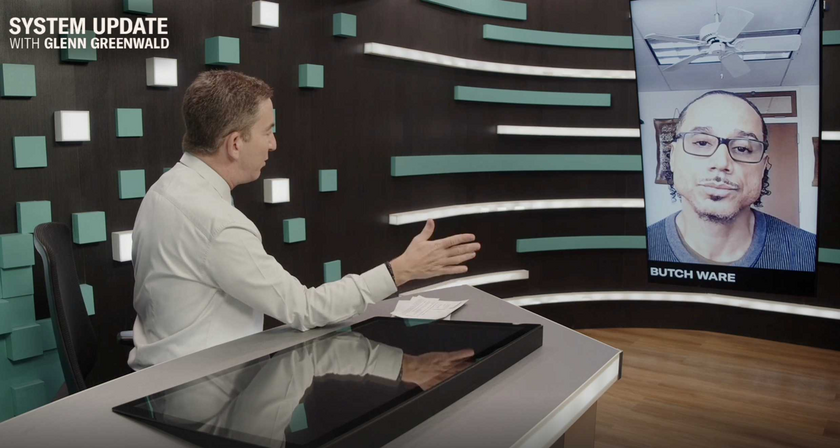
G. Greenwald: Dr. Ware, it's great to see you. Thank you so much for taking the time to come on our program and talk with us. We're glad to have you.
Butch Ware: Great to be with you, Glenn.
G. Greenwald: Absolutely. So, you have certainly had over the past several months a significant increase in visibility, definitely doing a lot of the rounds in the media, making people very aware. You've created a lot of positive impact on social media. So, I think people have a good understanding of sort of the summary background of who you are, where you've studied and what you've done but politically and ideologically speaking, could you talk about your trajectory from when you got into politics, what led you to the Green Party and how you became a candidate on its national ticket?
Butch Ware: Yeah. Not sure I am in politics. I would definitely qualify myself as a public servant before I would qualify myself as a politician. And I think when reclassified as a public servant, then it's really been 20-plus years. I'm doing similar work, activist work, academic work, organizing work and bringing communities together. I'm trying to leverage the kind of public visibility as well as the kind of community backing to bring about social change. And I think that that was probably what put me on the radar with the campaign. I did an Instagram live with Dr. Jill Stein just to learn more about her candidacy, to learn more about the Green Party platform and after I did that, literally within 24 hours, the Green Party reached out to me about the possibility of running as the VP candidate. So I went through a lengthy vetting process, made a lot of phone calls, and reached out to mentors, people in the Palestinian community, the black community, and the Muslim community more broadly. And I also realized that, like, I actually have very deep roots with the Green Party that I hadn't thought about, you know, sort of actualizing. My closest friend growing up, Sean Young, was actually the son of the longest-serving and first-ever elected Green Party official in the state of Minnesota, on the south side of Minneapolis, Annie Young, who was like a backup mother to my single mom, basically is the one that taught me everything I know about public service and, you know, kind of being engaged in political life in the public. So, in a lot of ways, it made a ton of sense. And then, when I found out that Dr. Jill Stein had been mentored by Annie Young in her early days in the Green Party, I realized that, while some people might not have seen this coming, this particular move makes a lot of sense at a lot of levels.
G. Greenwald: There's, of course, a long history that I think is deliberately whitewashed to make people think this never happened of third-party candidates, of independent candidates, having a very major role in our politics, going back to the century before during the Woodrow Wilson administration. Eugene Debs, the socialist candidate, was such a threat that they had to imprison him. Obviously, you go through the '60s and ‘70s, you're talking about things like the black power movement and radicals like Malcolm X and Marcus Garvey and the Socialists, the Weather Underground that grew up around the Vietnam War. I think in the last several decades, though, they've really kind of clamped down on this notion that, no, there's just a two-party system. Unless you're a billionaire, you can't really have any meaningful impact as someone outside of the two-party system. And a lot of people I know who now support the Green Party, who want an alternative to both parties, where people who originally, when they got into politics, had critiques of the Democratic Party, but at the end of the day, they felt like voting for them was the best way to advance their values, however unsatisfactory it was. And I'm wondering if that's the case for you. Was there a time ever in your kind of political consciousness when you saw the political world and social activism where you felt like the Democratic Party was a viable vehicle for you to do work in?
Butch Ware: Never. Not for a single day in my entire life. And the reason is that Malcolm X, El-Hajj Malik El-Shabazz, was, you know, sort of a mentor at a distance, temporally and spatially. I was born in 1973, Malcolm passed away before I came along, but the autobiography of Malcolm X led to my conversion to Islam and was the beginning of political consciousness for me, at age 15. And Malcolm warned about the Liberal. He described the Liberal as a fox, it bears its teeth and you think that it is smiling at you, but you are on the menu, whereas the conservative as a wolf, it bears its teeth and you know that it's there to eat. So, I've never in my entire adult life trusted either liberals or conservatives. And the two-party system that we – well, we don't have a two-party system – but the two parties that have come to dominate the American political system are dominated by liberals and conservatives. So, I've never thrown my lot in with the Democratic Party at any level. I voted for the Democrats in the first election that I ever voted – for Bill Clinton. I voted for Clinton the first time around, I was 18 years old, and I voted for Obama, in 2008. And I think that those are the only two times that I've actually voted in a presidential election. I'd have to go back and check on that. I think I voted in primaries at other points in time. My mom was somewhat engaged in Democratic Party politics in the city of Minneapolis, but because of Annie, we mostly stayed around Green and third-party movements. To return to your broader question that Bill Clinton election was the beginning of the end of viable options for third parties for a generation and the reason is Clinton sold out on campaign finance reform. My own understanding was that at that point in time, the Democratic Party was interested in campaign finance reform because all the corporate money was behind the Republican Party and this was something people now forget that Bill Clinton ran on. I was actually very much motivated by this because I thought that the influence of money in politics was going to make it impossible for people like Annie Young and others to do well and be successful. And what the Democrats found out is that if they went corporate, too, they could raise as much money or more than the Republicans could raise and we saw essentially for the past 30-plus years, the Clinton political machine dominate the Democratic Party and go further and further towards corporate selling out, to the point that they're now fundamentally indistinguishable. There is an ideological difference between, quote-unquote, “liberals” and quote-unquote, “conservatives” but there is no functional difference between Team Blue and Team Red when it comes to their beholdenness to AIPAC, to the war machine, to the 1%, to corporate dollars. And I made a social media post before I ever joined the campaign that said whether you vote Team Blue or Team Red, militarized fascism wins. Because what we're essentially seeing in the struggle between Democrats and Republicans is a struggle for factional control over the corporate machine of the 1%. Their patronage networks overlap fundamentally with AIPAC and the war machine. And there is just kind of a fight at the margin between certain kinds of identity groups on one side and Christian nationalists on the other but, ultimately, they serve the same corporate masters. And you are now seeing this with Team Blue as they recruit, you know, people that were well to the right of Ronald Reagan and, without blinking an eye, the Democratic Party embraces war criminals like Dick Cheney because, fundamentally, Team Blue and Team Red of the same team, I call them purple fascists.
G. Greenwald: Yeah, it was really interesting when Liz Cheney talked about not only her endorsement of Kamala but also her father's. She made very clear it's not just because of animosity toward Trump or his comportment. She said very clearly I'm more comfortable with the Foreign Policy ideology of the Democratic Party and Kamala Harris and Joe Biden than I am with the Trump-led Republican Party and no one was even confused by that. For me, that made complete sense. If I were Dick Cheney and my views had been what they had been his whole life, I feel very comfortable in the Democratic Party as it's currently constituted as well.
Let me ask you, just on a personal note, it kind of attracted my attention that you said, “Look, I'm not a politician. Don't call me that.” The reality is if you're running for any office where you're trying to get votes for yourself, by definition you sort of are, even if you don't think of yourself primarily as that, which I understand. I'm wondering, though, in the past, the Democrats attacked the Greens only when they lost and needed somebody to blame for their failures. They couldn't of course, (Ware laughs) So, after the elections are over, they’re going to reap scorn on Ralph Nader, in 2000 and then Jill Stein in 2016, to blame them. This time, I think it's the first time we're seeing this, there's a great deal of venom and attacks in a very coordinated way coming from some of the most prominent surrogates of the Democratic Party, AOC, Keith Ellison, coordinated DNC attacks, not just on both of you, but sort of on your person and your integrity. I mean, AOC called your party “predatory.” I'm wondering, I assume you knew you were going to open yourself up to attacks, but I'm wondering whether you understood or expected that it was going to be at the level of vitriol and kind of personal destruction that you're now seeing.
